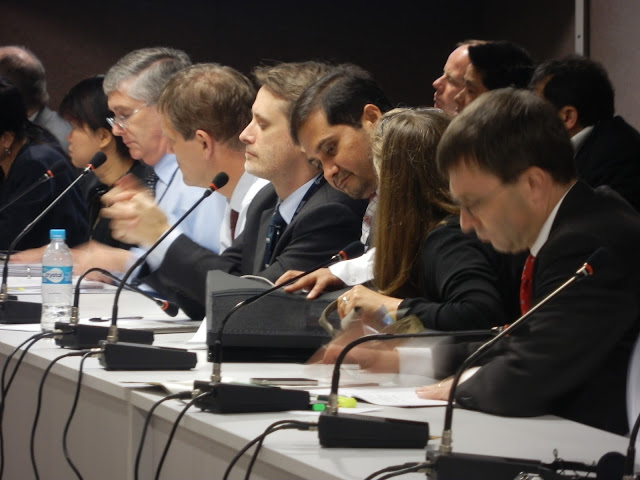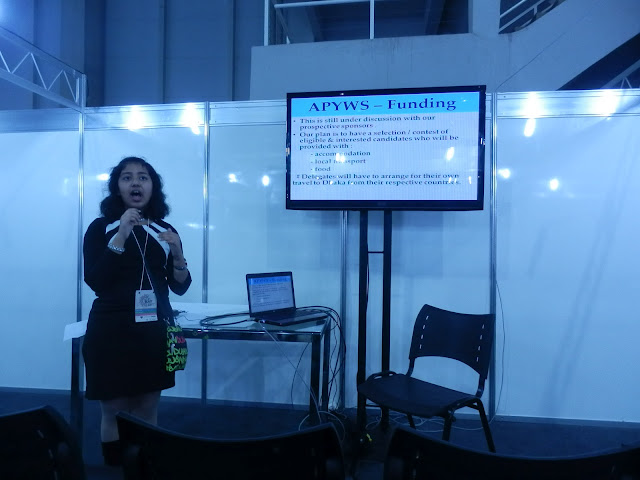 |
| Jean Paul shared his ideas on 'Global Rock Star' Music Contest. |
Side Event: Empowering Youth Leadership for a Sustainable Future
Several youth leaders were invited to share their projects on Rio+20 that were effectively mobilizing young people via music, spoken word and social media. The speakers were representatives from Rio+20 Global Youth Music Contest, tcktcktck Rio+20 Make a Date with History Contest, The Captain Planet Foundation and The Earth Charter.
I learnt about the Rio+20 global youth music contest via Facebook, where Mika Vanhanen from ENO Tree Planting Programme posted a song 'Act Now! Forest Matters' in that music contest and won the Jury Award. Guess a lot of 'like's were collected throughout the competition.
On the event I have the opportunity to listen to the big hand behind all these campaign or competitions, one of them is Jean Paul the global coordinator for this music contest. He said, how to make young people in rural area to be engaged with the Rio+20, if they have no internet access? activities among the community play important roles for youth participation. If the countries leaders are talking about solutions, the youth ourselves could help to create more solutions to the challenges facing our planet. Therefore to spark youths' creativity, enthusiasm and innovation, it is our responsibly to educate and empower more young people to be leaders of sustainability. The music contest is one of them.
Indeed youth could really help a lot to spread messages of global issues, as well as interconnect them in human services and social action. Today's youth talks about volunteerism because they are aware of the problem that exists around them and they show much concern. If people are not aware, do not have compassion towards the global issues, because they are living in their own circle, their world. However, Dalai Lama once said, for every being around us we are interconnected. Ignorance can stop us once to see truth, but it won't stop us from being affected by itself.
Do you remember, the girl who gave a 3 minutes shocking speech in front of world leaders in Rio+20 this time? She is Brittany Trilford! The 17-year-old New Zealander has actually won in the tcktcktck's competition of 'A Date with History', an online video speech competition which grant her the opportunity to speak in front of the world! What is tcktcktck? A Global campaign for climate action. You see, we all are actually powerful -- and creative. Gandhi said, be the change. There're people out there doing changes! and this is one of the example, using social media to make a movement. Incredible man!
Feeling amazed with the youth leaders who were speaking on stage, about their enthusiasm and inspiration to other people, I hope one day I could be one of them to inspire people too. However, today, I am preparing myself and doing my part. We learn and share our methods and solutions. We could have a Captain Planet or many many captains to steward the planet, as long as there're continuation works being push forward generations and generations to understand and love the natural world we are live in.
One common thing for these youth leaders and their representing international organizations is: they are on grassroots level, they walk into the homes, schools and communities that bring education of sustainable development directly.
It's like a gathering for these heads to meet each other from different parts of the world. One good thing of this event is I got to know these great, dedicated people - like the objective of this event, I am truly empowered and inspired.
The Speakers:
JJ Hurtak, PhD., and Desiree Hurtak, Ph.D Academy for Future Science, South Africa
Christina Stevens, Executive Director, Captain Planet Foundation
Catherine Skopic, Educator Arts and the Environment, Anglican Consultative Council
Nora Mahmoud, International Youth Facilitator, Earth Charter International
Karoline Buys, Youth Coordinator, Academy for Future Science, South Africa
Manish Joshi, Partner Outreach Director, Global Campaign for Climate Action (GCCA)
Ann Hughes, Kid Spirit Magazine
Jean Paul Brice Affana, Global Coordinator, Rio +20 Global Youth Music Contest
For your information:
ENO Tree Planting Day A huge tree planting network based in Finland, now move in many schools and many countries. Moving forward planting 100 million trees this year!
Earth Charter International has been a voice for the earth since the original Rio Conference and continues to network its wisdom around the globe offering free online courses for young people on sustainability, ethics, and leadership which can now include the outcomes of UNCSD/Rio+20.
a Date With History/tcktcktck is an organization which clearly understands that time is running out unless we are all willing to make the critical changes which Rio+20 will encourage. The networking of these groups together will enhance their efforts and magnify their voice to empower the youth globally.
A record of the day: 'Open Your Eyes' Milena and Radu (Romania)
See the gentle waters flow
On the crystal sand below
Hear them echo as the sailors row-row-row
To the north, the golden seeds
Never seem to fail our needs
As long as the sun will shine
We will all be fine-fine-fine
We just came here today
We feel so happy to say
Open your eyes and see the stars
Why can’t we just heal all the scars
Poluiton war and violence
Why do we all stay in silence
It’s about time you realize
You need to open your eyes
See the mountains way up high
Reaching far into the sky
Scraping clouds where only birds can fly-y y y
We’re waiting for the day when we
Will learn to live in harmony
All the peace and love we’ve found
Can make the world go round round round
We live on a green land
Its beauty has no end
Open your eyes and see the stars
Why can’t we just heal all the scars
Poluiton war and violence
Why do we all stay in silence
We can make it all work
We should stay together and be all so strong
Peace should guide us;
Love beside us
If we try together
we can make everything better
For us…
If we just open our eyes....
































